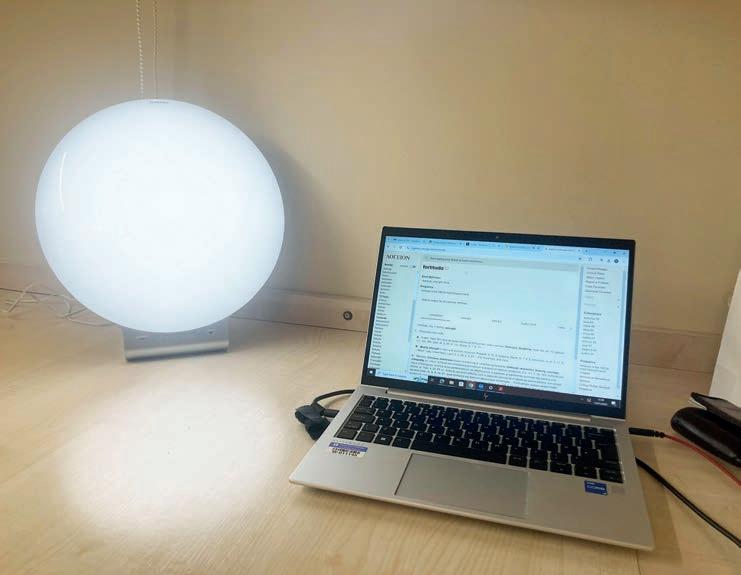
6 minute read
Learn Latin!
When it comes to learning Latin, we need just two things: people who really want to learn and the resources to help them. Resources, if they are good, can include anything from traditional grammar books, through videos to the most up-todate artificial intelligence app (AI).
Whatever works should be the rallying cry of the fledgling Latinist. My own experience learning Latin has given me some insights and I don’t expect the route to Latin will change much, except in some foreseeable ways that it is important to take account of, for we live in an age of rapidly changing technology.
Imagine you are bored on a Saturday morning and you decide you would like to learn some Latin.
Do you pick up a book or do you go on the Internet to find the friendliest robot tutor money can buy? They are both reasonable options but there are others.
It is of course a rare and not necessarily a particularly inspired person who sits down to memorise all the known forms of an ancient language from a book. All those wordendings! Believe me, dear reader, I have sat on buses at 6am struggling with the syntax of the supine.
But learning on a bus is hardly ideal.
Which is why I suggest you think hard about how committed you are to the idea of learning enough to understand the Latin you hear at Mass. As you are reading this magazine, I think it is safe to assume you will be highly motivated.
Great promises have been made in the past for all sorts of immersive and spoken-Latin based methods. I have even tried to teach using some of them myself, but the bottom line is that you still have to learn the rules – you have to learn, among other things, that word-endings in Latin, as in Greek and in English, Spanish or French do matter.
You need to know enough to navigate a page and to understand the Mass. For that, the trick is not to try to run before you can walk; instead, take it one page at a time.
On the Latin courses we run (which I’d say are still at the experimental stage, otherwise we’d be charging more!) you will, if you give us a try, access two important things that can help enormously: peer-to-peer fellowship and friendly, expert-guided support.
We’ll take it that these two things, hand in hand, are far better than trying to learn on your own or while sitting on a bus. We can’t promise that in 10 months you’ll have memorised all the word-endings. (Nor would you want to, and those that have tried, myself included, can’t remember them all.)
But we’ll give you something better, or we’ll try to: an awareness of the patterns of the typical Latin sentence — and what kinds of word mean what kinds of things, which is difficult to explain in an article such as this. Nevertheless, your native nous and undoubted language skills (you are reading this, after all!) will do the rest. And if it really takes off for you, I very much hope to see you in my Divine Office reading class – you will be in a small group of not more than four enthusiastic students.
How to get help with Latin: the simple guide
Reading grammar books. A perfectly good approach, but best avoided at the outset unless you are able to judge the good from the bad. Top of my list of the good books are Gildersleeve and Lodge (hard to spot an outright error even after a couple of centuries). Granted, this book can be a hard slog to read, but it’s extremely sensitive about the differences between classical and later — including Christian — Latin. But ideally you need a guide to a book like this. Don’t just sit down by the fire with it.
Artificial intelligence. Just as likely to have the same problems as traditional grammar books unless you have a guide.
Part of the knack with the intricacies of an ancient language is to understand the full range of possible uses of a particular form (such as a given case like the accusative). Taking two books about Greek published almost 50 years apart, but of a similar standard, my conclusion is: neither current AI nor either of these books nailed everything you, practically, need to know about, for example, the “genitive” case to read the Greek of the New Testament.
And the gaps, in both instances, were pretty sizeable – compared to what you need to know.
Our course: prayer-based videos. We offer ‘Latin shots’, which are five-minute videos, followed by live Divine Office classes. We use the latest Internet-based lexicographical along with other “assists” to help you function as a competent reader of texts.
For if you can’t function like that, then what is the point of trying to read another language in the first place? You want to be able to sit by the fire making sense of Latin on your own. Fortunately, the modern world has resources that most of us spent a long time doing without and we will use these on our courses, without overbalancing the gentle experience of turning the page of a Latin breviary.


I can’t promise our courses will work for everyone. And that’s in part because our first cohort has not yet completed its initial run at the language, using all the methods I’ve developed over half a decade to meet their needs. That cohort has a few months to go.
It takes 10 months to go through our initial program, so it’s not for the fainthearted. But it is considerably cheaper than enrolling at a university.
Here is what one recent joiner has said about his experience:
“You present with an air of authority, but humble and curious at the same time. It is a beautiful teaching style. I am smitten with this course.” (Deacon S. — Traditional Mass officiant (United States).
He is joined by Dr J., a retired palliative care specialist: “The big difference between my Latin skills at the beginning and end of the course is that I can now reason my way towards a solution rather than depending on parsing words individually.”
Our teaching methods are far quicker than the traditional university methods. I will leave it to Deacon S. to summarise: “As mentioned, I am a permanent deacon assigned to a shrine that offers the Ordinary and Extraordinary Forms of the Mass. I had Latin in High School — but that was over 40 years ago. I have looked at several Latin courses online, but was dissatisfied with them because their pedagogy was still based mainly on the memorization of tables, endings, etc… I am not critical of this pedagogy, but for a student who is 60 years old, working, and with a full liturgical schedule your more ‘curiosity’ based method resonates with me. Thank you!”
Matthew Spencer is co-organising a colloquium on AI, to be held at the university of Oxford in February. He has taught Latin to enthusiastic adult learners since lockdown.
More information about the writer’s courses from: info@saint-of-the-day. com










